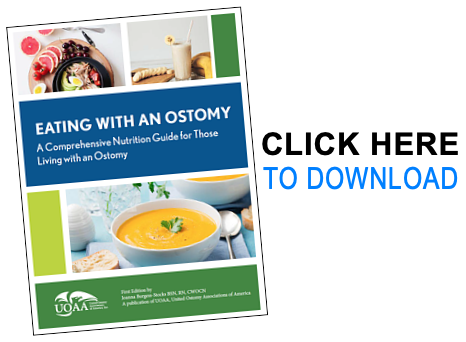Good nutrition plays a vital role in recovering from ostomy surgery, as an IBD diagnosis can pose nutritional challenges for many ostomates, including the following:
Appetite may decrease and patients may be unable to eat enough to sustain energy levels and growth.
During times of severe inflammation, the digestive tract may not absorb nutrients and/or the body may not use or allocate nutrients appropriately.
The body may need more calories to repair itself during and after increased periods of inflammation, ulceration and after surgery.
Some IBD medications and surgery may affect appetite and cause nausea and other side effects, making it difficult to eat and therefore maintain a good nutritional status.
In 2023, the Crohn’s & Colitis Foundation launched an evidence-based recipe finder tool powered by Nestlè Health Science. Gut Friendly Recipes, which is free to use, features more than 500 recipes vetted by dietitians who specialize in IBD and is designed not only for IBD patients but for anyone with chronic digestive issues or seeking a gut-friendly meal. Users can filter hundreds of recipes by diet (including the Crohn’s Disease Exclusion Diet, Mediterranean Diet, Specific Carbohydrate Diet ™, or the Low FODMAP Diet), occasion, and type of meal, and choose foods they want to exclude.
In addition, a great resource on navigating nutritional therapy for people with Crohn’s disease or ulcerative colitis is Nutritional Therapy for IBD. They are a volunteer-led non-profit organization dedicated to improving the lives and outcomes of patients with Crohn’s disease or ulcerative colitis through the use of nutrition. Many of their team members are individuals or family members of individuals with IBD.
How do we maintain nutrition
with Crohn’s Disease and an ostomy?
After surgery, a dietitian usually comes by in the hospital to help you understand how you can eat with your ostomy. Initially, the post-surgery diet may be bland and you may have to eat and drink slowly to see how you can tolerate different foods and drinks. The diet is usually low-residue and consists of white bread and rice, potatoes (without skins), bananas, Jell-O, and other easily digestible foods. Anything fibrous or difficult to digest is usually not recommended for 4-6 weeks after surgery.
After that 4-6 week period, however, you can work with a GI-specialized dietitian who can help you liberalize your diet slowly but surely. At this time, you may be able to reintroduce more types of grains, meats, fruits and vegetables one by one, starting with smoothies and purees and working your way forward in conjunction with your registered dietitian’s recommendations.
For additional details, please refer to UOAA’s Eating With an Ostomy Guide.
Written by Tina Aswani Omprakash. Medically reviewed and validated by Jordan Axelrad, MD, MPH. These webpages are funded by a grant from The Leona M. and Harry B. Helmsley Charitable Trust.




